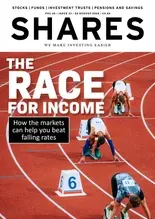
THIS IS AN ADVERTISING FEATURE
Dale Nicholls, Portfolio Manager , Fidelity China Special Situations PLC
Sentiment towards China remains weak, but the fundamental backdrop is improving and could represent an opportunity as we go through the year ahead given low valuations. Fidelity China Special Situations PLC’s Dale Nicholls looks past the macro headlines and analyses the key risks and opportunities facing investors in China in the year ahead.
What is your investment outlook for 2024 given the prevailing macro environment?
After a spell of increased uncertainty over China’s growth trajectory post-Covid reopening, the mood music has moved to a slightly more positive tone in recent weeks. Regulatory concerns are now less relevant, and the narrative again focuses more on growth with 5% annual GDP growth target seems largely on track. We believe the current backdrop reflects a measured growth outlook going into 2024.
In the face of a problematic property market, the refinancing conditions for property developers will likely remain challenging in the near-term, despite more supportive policies. However, this is not detrimental to all property developers. While we don’t expect a huge property rebound given the structural challenges, home prices are showing signs of resilience, especially in top tier cities. Ultimately, the existing divergence between developers could be magnified further. The indiscriminate sell-off provides an opportunity for active investors that can successfully identify the leading players, who are most likely to benefit from lower funding costs and can gain market share as cash-strapped developers struggle.
More generally, the direction towards regulatory loosening is clear. We have already seen action taken to boost consumer confidence, such as tax breaks on the purchase of electric vehicles and lower mortgage requirements for home buyers. On the other hand, job and wage cuts have clearly hurt consumer confidence. However, from our discussions with companies we have the sense that the worst is behind us.
Over the longer-term, improving corporate earnings could be a key driver for investor confidence to come back. Meanwhile, valuations in the Chinese equity market remain compelling both in historical terms and compared with some other major markets. Clearly, a lot of pessimism over the economy appears priced in.
What do you think could surprise markets in 2024?
Investor sentiment towards China has been extremely weak, so a positive turn here could be a big surprise in 2024. A key area to watch will be the pace of the consumption recovery. Chinese citizens are sitting on record amounts of savings, but consumer confidence and household consumption remain clearly muted so far. Factors driving this could include weaker business confidence, particularly given well-publicised job cuts at the big tech companies and youth unemployment headlines, but also the ongoing property crisis given the weight of housing costs on the consumer balance sheet. From our discussions with companies, we think the worst of the job cuts are behind us, particularly in the tech sector. We think continued improvements in the job market will be crucial for consumption to support growth and it has been encouraging to see the overall unemployment rate start to decline from Q3 2023.
On the other hand, we continue to see financial stress on property developers and although the market is showing signs of stabilising, things are fragile. Given the size of the sector, broader financial sector risks need to be monitored. We are aware of the challenging situations faced by many local governments amid falling land sales and lingering LGFV debt risks. Having said that, the recently approved central government debt marks a critical change and suggests that the government is becoming more willing to deploy its balance sheet to achieve economic stability.
What has worked well in your portfolio over 2023?
Despite the challenging economic backdrop in China over 2023, we were still able to focus on great individual companies with good growth potential. At a sector level, robust stock picking in the consumer discretionary and health care sectors worked well. Holdings in Hisense Home Appliances and branded variety retailer MINISO Group advanced following the initial reopening rally earlier in the year. Within health care, our preferred holdings in WuXi AppTec contributed positively to performance on the back of upbeat results.
Elsewhere, a significant underweight exposure to e-commerce platforms Meituan and JD.com also proved rewarding, as many companies in the space came under pressure amid an intensified competitive landscape and potential market share loss.
|
Past Performance % |
|||||
|
|
Oct 2018 - Oct 2019 |
Oct 2019 - Oct 2020 |
Oct 2020 - Oct 2021 |
Oct 2021 - Oct 2022 |
Oct 2022 - Oct 2023 |
|
Net Asset Value |
10.9 |
61.3 |
-5.2 |
-39.1 |
14.3 |
|
Share Price |
12.0 |
80.1 |
-11.7 |
-43.2 |
16.4 |
|
MSCI China Index (Net) |
11.5 |
35.3 |
-14.4 |
-38.0 |
14.9 |
|
Past performance is not a reliable indicator of future returns. Source: Morningstar as at 31.10.2023, bid-bid, net income reinvested. ©2023 Morningstar Inc. All rights reserved. The MSCI China Index (Net) is a comparative index of the investment trust. |
|||||
Where are the key areas of opportunity in 2024?
It’s widely recognised that the long-term plan of Chinese government seeks to reduce the economy’s reliance on investment and property and pivot towards high-end manufacturing and domestic consumption. The pace of innovation in China remains strong, primarily led by private sector firms in sectors such as industrials and health care. Globally leading Chinese firms have emerged in areas such as electric vehicles and renewable energy. These factors are driving consolidation across a range of sectors, many of which remain very fragmented.
While overseas investors may focus on the impact on China of de-globalisation and ‘near-shoring’ of industry, the corollary to this is an increasing preference among Chinese consumers for Chinese brands. This is resulting in domestic companies taking ever greater market share in what remains one of the world’s largest markets.
Important Information:
The value of investments and the income from them can go down as well as up, so you may get back less than you invest. Past performance is not a reliable indicator of future returns. Reference to specific securities should not be construed as a recommendation to buy or sell these securities and is included for the purposes of illustration only. Investors should note that the views expressed may no longer be current and may have already been acted upon. Overseas investments are subject to currency fluctuations. Fidelity China Special Situations PLC can use financial derivative instruments for investment purposes, which may expose it to a higher degree of risk and can cause investments to experience larger than average price fluctuations. This trust invests more heavily than others in smaller companies, which can carry a higher risk because their share prices may be more volatile than those of larger companies and the securities are often less liquid. This Investment Trust invests in emerging markets which can be more volatile than other more developed markets. The shares in the investment trust are listed on the London Stock Exchange and their price is affected by supply and demand. The investment trust can gain additional exposure to the market, known as gearing, potentially increasing volatility. This information is not a personal recommendation for any particular investment. If you are unsure about the suitability of an investment you should speak to an authorised financial adviser.
The latest annual reports, key information document (KID) and factsheets can be obtained from our website at www.fidelity.co.uk/its or by calling 0800 41 41 10. The full prospectus may also be obtained from Fidelity. The Alternative Investment Fund Manager (AIFM) of Fidelity Investment Trusts is FIL Investment Services (UK) Limited. Issued by FIL Investment Services (UK) Limited , authorised and regulated by the Financial Conduct Authority. Fidelity, Fidelity International, the Fidelity International logo and F symbol are trademarks of FIL Limited.
UKM1123/384621/ISSCSO00141/NA/2




